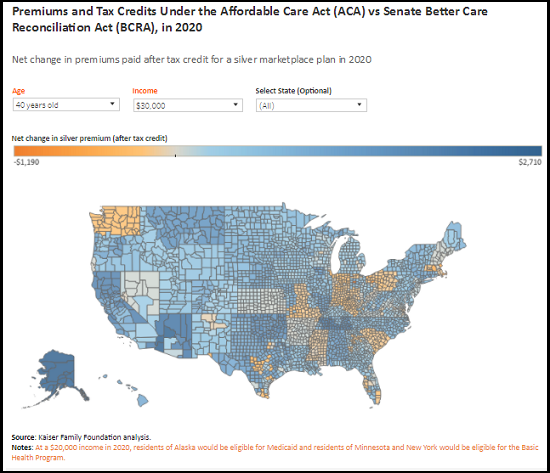|
New County-Level Map Compares Premiums and Tax Credits Under Senate
Health Bill and ACA
A new interactive map from the Kaiser Family Foundation
compares county-level estimates of premiums that consumers would pay under
the Affordable Care Act (ACA) in 2020 with what they’d pay under the Senate’s
discussion draft, Better Care Reconciliation Act (BCRA), a replacement plan
unveiled last Thursday.
The maps include premium and tax credit estimates
by county for current ACA marketplace enrollees at age 27, 40, or 60 with an
annual income of $20,000, $30,000, $40,000, $50,000, $60,000, $75,000,
$100,000, or 351 percent of the federal poverty level (which is just above
the cutoff for tax credits under the BCRA). The map includes estimates for
premiums, tax credits, and premiums after tax credits, for bronze and silver
marketplace plans in each county in 2020.
Both the ACA and the Senate’s bill include tax
credits to help consumers pay premiums for individual insurance. Both take
into account family income, local cost of insurance, and age in calculating
tax credits; however, they differ in how they determine the percentage of
income an individual must pay toward their premium. The ACA and Senate bill
also base tax credits on different benchmark plans, with the Senate bill
tying the credits to plans with higher cost sharing for consumers.
An earlier map from the Foundation compares ACA
premiums and tax credits to those in the House-passed American Health Care
Act.
Also new from the Foundation: a detailed summary of the Senate’s new discussion draft, the Better Care
Reconciliation Act, a plan released Thursday to repeal and replace the
Affordable Care Act (ACA). Users can
compare the Senate bill to current law and the House-passed American Health
Care Act in 17 key areas of health policy, including Medicaid, premium
subsidies to individuals, state role, financing, women’s health, and
individual health insurance market rules.
Filling
the need for trusted information on national health issues, the
Kaiser Family Foundation is a nonprofit organization based in Menlo Park,
California.
|
|
|
To be a Medicare Agent's source of information on topics affecting the agent and their business, and most importantly, their clientele, is the intention of this site. Sourced from various means rooted in the health insurance industry - insurance carriers, governmental agencies, and industry news agencies, this is aimed as a resource of varying viewpoints to spark critical thought and discussion. We welcome your contributions.
Monday, June 26, 2017
New County-Level Map Compares Premiums and Tax Credits Under Senate Health Bill and ACA
Subscribe to:
Post Comments (Atom)

No comments:
Post a Comment